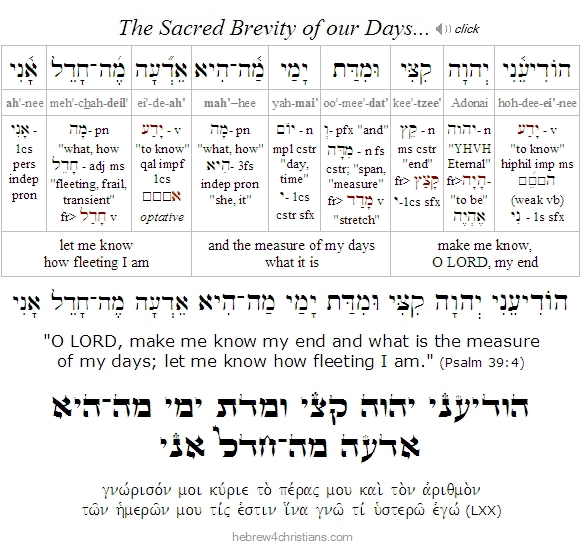|
In the Gospel of Luke we read that some people once came to Yeshua to share the terrible news that Pontius Pilate had murdered several Jews from Galilee as they were offering sacrifices at the Temple (Luke 13:1). Apparently Pilate even mingled the blood of these Galileans with their offerings! Horrible. Dreadful. How could this have happened? Why would God allow such a thing?
We are unsure why these people shared this awful news with Yeshua. Were they testing him? Perhaps they hoped he would openly identify with the Zealots who sought to overthrow the Romans, or perhaps they wanted him to say that the Galileans deserved retribution for some sort of wickedness -- or perhaps they just shared out of morbid concern -- but regardless of their motive, Yeshua replied by asking them a question: "Do you think these Galileans were worse sinners than all the other Galileans, because they suffered these things?" And then he added: "I tell you, no; but unless you repent you will all likewise perish" (Luke 13:2-3). Now that was unexpected. Why did he say that the same sort of fate would befall them? Yet to reiterate his point, Yeshua recalled the sudden death of several people when the Tower of Siloam fell: "Those eighteen who were killed when the tower in Siloam fell on them, do you think they were worse offenders than all the others who live in Jerusalem? I tell you, no; but unless you repent you will all likewise perish" (Luke 13:4-5). There's no mention of the reaction of the people when Yeshua said this, but it was likely one of shock, anger, and fear.
What was Yeshua trying to teach by his response to these tragedies? Was he being cruel to point out that unless people repent, they would suffer tragedy in their lives? Well first it is likely that he was countering the assumptions behind the thinking of his listeners, namely, the idea that unexpected death happens only to people who are notoriously bad and therefore deserve judgment from heaven. On the contrary, trouble often befalls the righteous, while worldly success and comforts often are gained by the wicked. Yeshua therefore rejects simplistic answers as to why death happens, and he instead consigns tragedies, suffering, and trouble to be an inescapable part of life in a broken and fallen world. Death is the inheritance of all the children of Adam, and humanity is under the divine curse until it would be removed by the atonement of the Yeshua upon the altar of the cross (Gal. 3:13). If there is a deeper reason as to why particular tragedies occur, we are not privy to such information. Yeshua, however, warns us from thinking that some people deserve judgment more than others, but on the contrary, that all people are sinners in need of salvation (Rom. 3:23).
The lethal consequence of the fall of Adam extends beyond acts of human sinfulness, to natural disasters and matters of sickness, disability, and physical death, however. For example, when the disciples encountered a man who had been born blind they asked Yeshua: "Rabbi, why was this man born blind? Was it because of his own sins or his parents' sins?" Yeshua then answered: "It was not that this man sinned, or his parents, but that the works of God might be manifest in him" (John 9:1-3). Though we naturally assume that there must be a reason for whatever happens, we are not given explicit explanations, and therefore we should be cautious when making inferences. It is a matter of trust that God will bring about a wonderful end for us -- even if we presently may experience pain, sorrow, and various kinds of suffering in our lives. That's part of the consummation of our redemption, after all. However, it is written: "We must through much tribulation enter into the kingdom of God" (Acts 14:22) and "Unless a grain of wheat falls into the earth and dies, it remains alone; but if it dies, it bears much fruit" (John 12:24). We are both redeemed people but we live within fallenness...
Sadly people often die with little warning and for no clearly identified reason. Life is precarious, fragile, and poignant. Yeshua does not defend God's governance of the universe; he knows His heavenly Father is loving, just, and righteous in all his ways. He groans over our suffering and indeed tastes death for every one. He was born to die. "My God, my God, why have you forsaken me?" was his cry on the cross, in the hour of his abandonment and utmost grief. Yeshua entered in the depths of our sin and embraced it as his concern and passion to remedy on our behalf. He was alone in the dark cloud to intecede for us...
In light of the unpredictable perils of life, then, Yeshua wants all people to understand their great need for teshuvah, or repentance. This was the burden of his ministry to us, the very reason he came. And indeed teshuvah is first word of his proclamation: "The time is fulfilled, and the kingdom of God is at hand. Repent, and believe in the gospel" (Mark 1:15). Yeshua wants everyone to know their need for deliverance and his power to save them from death...
The central problem for human beings - both for the so-called good as well as the bad - is that of spiritual death, that is, the destruction of one's soul. The danger is real for all of us. Each of us may be unprepared for sudden death, and therefore it is vital to turn to God for life while we have the opportunity. We must be wary of a false sense of security; we must understand our radical need for healing and turn to God for salvation. Time is running out. Our days are numbered. We must sincerely repent lest we perish in uncertainty and darkness of heart...
But this is not all. Yeshua continued his teaching about the danger of perishing without repenting by giving the "parable of the fig tree" (Luke 13:6-9). A certain man had a fig tree in his vineyard that did not bear fruit. When he decided to cut the tree down, his gardener intervened: "Sir, give it one more chance; leave it another year, and I'll give it special attention and plenty of fertilizer. Then if it bears fruit next year, well and good; but if not, you can cut it down." Among other things this parable teaches that a tree that is fruitless will eventually be destroyed, echoing John the Baptist's warning to turn to the Savior for life: "Even now the ax of God's judgment is poised, ready to sever the roots of the trees. Yes, every tree that does not produce good fruit will be chopped down and thrown into the fire!" (Matt. 3:10). The fruit here is that of teshuvah, or repentance (Luke 3:8). The "fruits worthy of repentance" are those derived from heartfelt trust in God's salvation, resulting in a radical change of direction, an abiding abhorrence over personal sin, and an earnest turning to God to escape from the wrath to come - the wrath that is ready to break forth in fiery judgment upon the earth. True repentance is a change of mind (μετάνοια), "taking down high thoughts and bringing them into obedience to Christ" (2 Cor. 10:5). The parable teaches that a life devoid of teshuvah, and in particular a soul devoid of faith in Yeshua as the Savior and deliverer of the soul, will be unprepared for death. The gardener is patient and does everything he can to rescue the tree, but if the tree continues to be fruitless, it will be removed suddenly and irrevocably. The point of the parable is a great question. Will fruit emerge in time before the tree would be felled in judgment? How much time remains for the tree before its day of reckoning comes?
Why does God want us to face the truth about death? Why does Moses ask God to teach us to "number of our days?" (Psalm 90:12). Why does David pray: "LORD, make me to know mine end, and the measure of my days, what it is; that I may know how frail I am" (Psalm 39:4)? The reason is that by nature people deny the reality of death - they hide their eyes from it, ignore it, and pretend it's not there - so they can continue to live under the illusion that they are in control of their lives, that they are the center, that they are immortal little "gods." Death threatens the ego and humbles us to confess the truth about life, namely that we are not in control, that we cannot choose to be immortals, that we do not have power to exist in ourselves, and therefore we need life from a different source - spiritual life - wherein we receive a new identity and a new being found in relation to God.
So in light of all this, what can we learn about repentance? Far more than moral reformation or "self-improvement," the word teshuvah means turning to God in our brokenness, regretting the sin of our life, and fundamentally changing the way we think. Most of all it means trusting in God, believing in the miracle of resurrection life, and relying upon his promises despite the transience, jeopardy, and uncertainty of our lives in this world. Repentance is the confession of our fragility and of our need for God to carry us through the darkness into the presence of his glorious light; it means finding faith to be healed from the sickness of spiritual death and to exist as a new creation for God's glory. It believes that one day we will be home in the house of God's unending love... Repentance is a heart that won't let go of God's love.
Hebrew Lesson
Psalm 39:4 Hebrew reading (click):
 |
|



